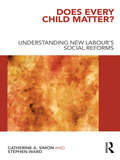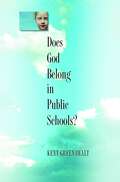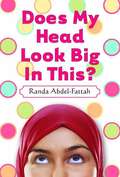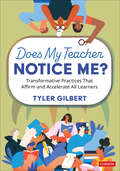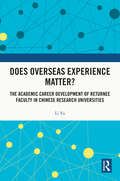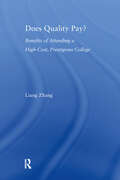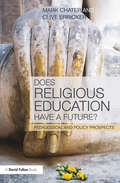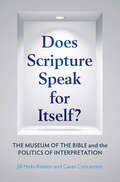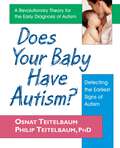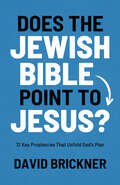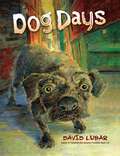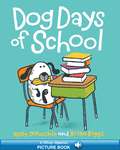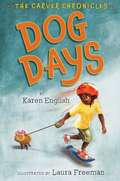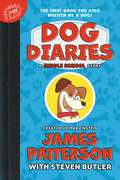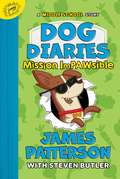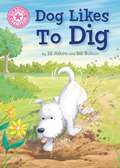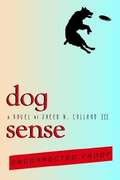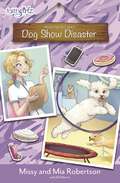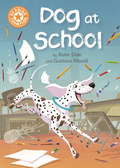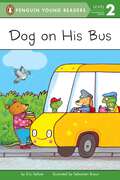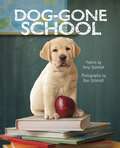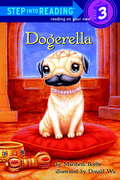- Table View
- List View
Does Every Child Matter?: Understanding New Labour's Social Reforms
by Stephen Ward Catherine A. SimonEvery Child Matters represents the most radical change to education and welfare provision in almost two decades. This book moves beyond a descriptive ‘how to’ framework to examine the underlying political and social aims of this policy agenda. The authors’ analysis reveals that Every Child Matters represents the Government’s attempt to codify perceived risks in society and to formulate their responses. In doing so, children are made the strategic focus of much wider social policy reform, the effects of which are first felt in education. Does Every Child Matter? explores the ramifications of this along three key lines of analysis: the restructuring of the state beyond its welfare functions changes in governance and the creation of new binaries a redefining of the education sector around the needs of the child. This book provides a unique and insightful critique of Every Child Matters and its contribution to understandings of New Labour social policy. It locates the genesis of the policy in terms of its social, political and historical contexts and questions the validity of constructing social policy around issues of child welfare. Students, academics and researchers in education studies and education policy will find this book of great interest.
Does God Belong in Public Schools?
by Kent GreenawaltControversial Supreme Court decisions have barred organized school prayer, but neither the Court nor public policy exclude religion from schools altogether. In this book, one of America's leading constitutional scholars asks what role religion ought to play in public schools. Kent Greenawalt explores many of the most divisive issues in educational debate, including teaching about the origins of life, sex education, and when--or whether--students can opt out of school activities for religious reasons. Using these and other case studies, Greenawalt considers how to balance the country's constitutional commitment to personal freedoms and to the separation of church and state with the vital role that religion has always played in American society. Do we risk distorting students' understanding of America's past and present by ignoring religion in public-school curricula? When does teaching about religion cross the line into the promotion of religion? Tracing the historical development of religion within public schools and considering every major Supreme Court case, Greenawalt concludes that the bans on school prayer and the teaching of creationism are justified, and that the court should more closely examine such activities as the singing of religious songs and student papers on religious topics. He also argues that students ought to be taught more about religion--both its contributions and shortcomings--especially in courses in history. To do otherwise, he writes, is to present a seriously distorted picture of society and indirectly to be other than neutral in presenting secularism and religion. Written with exemplary clarity and even-handedness, this is a major book about some of the most pressing and contentious issues in educational policy and constitutional law today.
Does My Head Look Big In This?
by Randa Abdel-FattahWhen sixteen-year-old Amal decides to wear the hijab full-time, her entire world changes, all because of a piece of cloth ... Sixteen-year-old Amal makes the decision to start wearing the hijab full- time and everyone has a reaction. Her parents, her teachers, her friends, people on the street. But she stands by her decision to embrace her faith and all that it is, even if it does make her a little different from everyone else. Can she handle the taunts of "towel head," the prejudice of her classmates, and still attract the cutest boy in school? Brilliantly funny and poignant, Randa Abdel-Fattah's debut novel will strike a chord in all teenage readers, no matter what their beliefs.
Does My Teacher Notice Me?: Transformative Practices That Affirm and Accelerate All Learners
by Tyler GilbertHow well do you notice your students? Affirming students’ thinking and adapting the learning experience to support and advance their understanding is an act of both expertise and compassion. This is teacher noticing. Does My Teacher Notice Me? emphasizes the often-overlooked skill of teacher noticing: observing or paying attention to students’ thinking and following up with appropriate actions to elevate or advance their learning experience or knowledge. By exploring the characteristics and components of expert teacher noticing, this hands-on resource provides guidance for educators seeking to elevate their teaching practice, enhance student engagement, and boost learning outcomes. Inside, you′ll discover How to observe and respond to student needs in the moment Strategies for fostering meaningful conversations with students Learning intentions, success criteria, prompts, templates, and reflection questions that bring the content to life Tips for cultivating compassion in the classroom Effectively noticing is a complex yet essential aspect of teaching expertise. Does My Teacher Notice Me? helps teachers puts students at the center of the learning process. Through this book, teachers will adopt a different way of being present with learners and discover new ways of having more meaningful conversations that lead to student success.
Does My Teacher Notice Me?: Transformative Practices That Affirm and Accelerate All Learners
by Tyler GilbertHow well do you notice your students? Affirming students’ thinking and adapting the learning experience to support and advance their understanding is an act of both expertise and compassion. This is teacher noticing. Does My Teacher Notice Me? emphasizes the often-overlooked skill of teacher noticing: observing or paying attention to students’ thinking and following up with appropriate actions to elevate or advance their learning experience or knowledge. By exploring the characteristics and components of expert teacher noticing, this hands-on resource provides guidance for educators seeking to elevate their teaching practice, enhance student engagement, and boost learning outcomes. Inside, you′ll discover How to observe and respond to student needs in the moment Strategies for fostering meaningful conversations with students Learning intentions, success criteria, prompts, templates, and reflection questions that bring the content to life Tips for cultivating compassion in the classroom Effectively noticing is a complex yet essential aspect of teaching expertise. Does My Teacher Notice Me? helps teachers puts students at the center of the learning process. Through this book, teachers will adopt a different way of being present with learners and discover new ways of having more meaningful conversations that lead to student success.
Does Overseas Experience Matter?: The Academic Career Development of Returnee Faculty in Chinese Research Universities
by Li YuThe book explores the academic characteristics, career development, and impacts of “foreignness” of Chinese overseas returnees in research universities. It provides valuable insights into the international mobility of academics and the challenges and opportunities that returnee scholars face in terms of research, teaching, international exchange, income, academic promotion, job satisfaction, and career mobility in their academic careers. Using first-hand large-scale survey data, the author presents quantitative analyses of the international mobility of Chinese academics at the individual level. She evaluates the impact of overseas experience on academic career development, and further proposes practical policy suggestions to attract and retain returnee talent in academia in China. The book’s findings have important implications for policy-makers, university administrators, and academics who seek to address the challenges and opportunities of international academic careers and promote the internationalization of research universities in China and beyond.
Does Quality Pay?: Benefits of Attending a High-Cost, Prestigious College
by Liang ZhangPrevious research has generally shown a very small although statistically significant economic benefit from attending high-quality colleges. This small effect was at odds with what students' college choice and various social theories would seem to suggest. This study sought to reconcile the empirical evidence and theories. The effort was in two directions. First, the economic effect of college quality was expanded from examining only the economic benefit to considering other student outcomes including job satisfaction and graduate degree accomplishment. A new perspective regarding the social role of college quality was offered in conclusion.
Does Religious Education Have a Future?: Pedagogical and Policy Prospects
by Clive Erricker Mark ChaterThe place of religion in the modern world has changed significantly over the past two decades. This has been partially reflected in the academic study of religion, but little, if at all, in religious education. In addition, the place of RE in schools has been the subject of intense debate due to changes to the curriculum and school structure, as well as being part of wider debates on religion in the public sphere. Written by two highly experienced leading practitioners of RE, Does Religious Education have a Future? argues for a radical reform of the subject based on principles of pedagogy set free from religious concerns. It challenges teachers, researchers and educators to rethink their approaches to, and assumptions about, religious education, and enables them to see their work in a larger context that includes pedagogical ideas and political forces. The book offers readers fresh, provocative and expertly informed critical perspectives on: the global context of RE, debates about religion in public places, religion’s response to modernity, violent extremism, science and secularism; the evolving educational rationale for RE in schools; the legal arrangements for RE and their impact on the teaching of the subject; the pedagogy of teaching approaches in RE and their effect on standards and perceptions of the subject; the educational commitment of faith/belief communities, and how this influences the performance of RE. Does Religious Education have a Future? proposes a new attitude to the subject of religious education, and a new configuration of both its role and content. This book is essential reading for academics, advisers and policy makers, as well as teachers of RE at primary and secondary levels and trainee and newly qualified teachers.
Does Scripture Speak for Itself?: The Museum of the Bible and the Politics of Interpretation
by Cavan Concannon Jill Hicks-KeetonIs the Bible the unembellished Word of God or the product of human agency? There are different answers to that question. And they lie at the heart of this book's powerful exploration of the fraught ways in which money, race and power shape the story of Christianity in American public life. The authors' subject is the Museum of the Bible in Washington, DC: arguably the latest example of a long line of white evangelical institutions aiming to amplify and promote a religious, political, and moral agenda of their own. In their careful and compelling investigation, Jill Hicks-Keeton and Cavan Concannon disclose the ways in which the Museum's exhibits reinforce a particularized and partial interpretation of the Bible's meaning. Bringing to light the Museum's implicit messaging about scriptural provenance and audience, the authors reveal how the MOTB produces a version of the Bible that in essence authorizes a certain sort of white evangelical privilege; promotes a view of history aligned with that same evangelical aspiration; and above all protects a cohort of white evangelicals from critique. They show too how the Museum collapses vital conceptual distinctions between its own conservative vision of the Bible and 'The Bible' as a cultural icon. This revelatory volume above all confirms that scripture – for all the claims made for it that it speaks only divine truth – can in the end never be separated from human politics.
Does Your Baby Have Autism?
by Philip Teitelbaum Osnat TeitelbaumFor many years, the diagnosis ofautism has centered on a child's social interaction—from poor eye contact tolack of language skills. Although the autism community agrees that earlyintervention is key to effective treatment, the telltale signs of this disorderusually don't reveal themselves until the age of two or three. But what if itwere possible to detect the potential for autism within the first year of life?That is the basis of Osnat and Philip Teitelbaum's book, Does Your Baby Have Autism?This dedicated wife-and-husband team has worked for nearly two decades to develop ways of detecting signs of potential autism or Asperger's syndrome by examining a child's early motor development. By studying the patterns of righting, sitting, crawling, and walking in typical infants, and comparing them with those of children who were later diagnosed with autism, the authors have been able to pinpoint movement patterns that appear to be the precursors of autism and Asperger's.Does Your Baby Have Autism? first provides general information aboutthe history of autism, followed by a discussion of The Ladder of MotorDevelopment. Each of four chapters then examines one motor milestone--righting,sitting, crawling, or walking--contrasting typical development with atypicaldevelopment so that it's easy to recognize unusual patterns of movement. Also included is a unique thirty-second Tilt Test--easy toperform at home--which helps reveal a balance problem characteristic ofchildren with autism. Finally, parentsare guided in finding professional help for a child whose motor skills mayindicate a problem.There is a way to detect signs of autism early in a child's life, when therapy can do the most good. Does Your Baby Have Autism? holds the key to a brighter future for children and their families.
Does Your Family Make You Smarter?
by James R. FlynnDoes your family make you smarter? James R. Flynn presents an exciting new method for estimating the effects of family on a range of cognitive abilities. Rather than using twin and adoption studies, he analyses IQ tables that have been hidden in manuals over the last 65 years, and shows that family environment can confer a significant advantage or disadvantage to your level of intelligence. Wading into the nature vs. nurture debate, Flynn banishes the pessimistic notion that by the age of seventeen, people's cognitive abilities are solely determined by their genes. He argues that intelligence is also influenced by human autonomy - genetics and family notwithstanding, we all have the capacity to choose to enhance our cognitive performance. He concludes by reconciling this new understanding of individual differences with his earlier research on intergenerational trends (the 'Flynn effect') culminating in a general theory of intelligence.
Does the Jewish Bible Point to Jesus?: 12 Key Prophecies That Unfold God's Plan
by David BricknerHow will we be able to recognize the Messiah? Christians claim that Jesus is the Messiah, but how can we know if that is true? Jesus revealed the truth about himself through passages in the Torah, the Prophets, and the Writings—which together comprise the Tanakh (the Old Testament). In Does the Jewish Bible Point to Jesus?, Messianic Jewish author David Brickner likewise guides us through twelve prophecies from all three sections of the Tanakh to show:why God promised a Messiah.how God planned to bless the whole world through the Jewish people.the location and strange circumstances of the Messiah's birth.how and why the Messiah would suffer and die.how the Messiah would exceed human limitations . . . and more.You&’ll also find stories of contemporary Jewish people who discovered compelling connections to Jesus in their own Bibles.Whether you&’re curious, skeptical, or a committed believer—if you are in search of truth, this book is for you. Come and see how God&’s timeless plan to redeem and renew the world still shines as a beacon of hope today.
Dog Days (Exceptional Reading And Language Arts Titles For Intermediate Grades Ser.)
by David LubarLarry can't stop thinking about the growling dog in the alley. He already has three strays in his backyard. How can he afford to take care of another one? When his brother Paul points out a strange mark in the alley, Larry has a mystery to solve. What is the dog protecting? What is really going on in that dark alley?
Dog Days of School
by Kelly DiPucchioCharlie thinks his dog, Norman, has got it good: he gets to spend his days lounging on the couch or playing fetch, and he never has to do any homework. But when Charlie makes a wish to be a dog instead of a boy, things get a little topsy-turvy! New York Times best-selling author Kelly DiPucchio's signature humor and Brian Biggs's bold, playful illustrations come together in a hilarious tale that proves that the grass always does look greener on the other side (even if that side involves drinking from the toilet!).
Dog Days: The Carver Chronicles, Book One (The Carver Chronicles #1)
by Karen English Laura FreemanIt's tough being the new kid at Carver Elementary. Gavin had lots of friends at his old school, but the kids here don't even know that he's pretty good at skateboarding, or how awesome he is at soccer. And when his classmate Richard comes over and the boys end up in trouble, not only does Gavin risk losing his one new friend, he has to take care of his great aunt Myrtle's horrible little dog as punishment. To make matters worse, Gavin seems to have attracted the attention of the school bully. Will he be able to avoid getting pounded at the skate park? And how is he ever going to prove he's cool with a yappy little Pomeranian wearing a pink bow at his side?
Dog Diaries: A Middle School Story (Dog Diaries #1)
by James PattersonThe first book in the doggone awesome, howl-ariously illustrated, bestselling series from the creator of Middle School! Rafe Khatchadorian&’s lovable dog Junior gets his chance to shine. Oh boy, oh boy, oh boy! I've been waiting for ages to tell my story, and now it's finally happening! Being Rafe's dog isn't always easy, but it is always EXCITING! I've got so much to tell you about: How I protect the yard from birds, raccoons, squirrels, raccoons, mail carriers ... and did I mention RACCOONS? Sniffing pooch posteriors for the latest canine news. And the terrifying monster hiding in the hall closet: the vacuum cleaner! These were all the most paw-some parts of my doggie life -- until the evil Mrs. Stricker threatened to send me back to the pound if I didn't learn to behave. Now Rafe and I have to go to obedience school and win the trophy for Best Trained Dog . . . or else!
Dog Diaries: A Middle School Story (Dog Diaries #3)
by James Patterson Steven ButlerGrab your sunglasses and slather on the sunscreen! In this laugh-out-loud adventure for kids and animal lovers everywhere, summer is here and Junior is getting his very own doggy vacation.It's me, Junior, back again with another tail-wagging tale of mischief-making! I'll tell you all about the fur-raising time I had when my pet humans went on a trip without me, and the horrible place they left me. Here are some of the adventures I had:How I survived on a diet of icky vegetables, with no yummy, drool-inducing meat in sight!My super-secret plan to steal delicious hamburgers!How my pooch pals and I cooked up a grand scheme to break free and get back home. It's a dangerous mission, but as I always say, you can't keep a good dog down!
Dog Goes to Nursery School
by Lucille HammondLittle Dog wants to stay home and play; but his mother says that he must go to school.
Dog Likes to Dig: Independent Reading Pink 1A (Reading Champion #91)
by Jill AtkinsReading Champion offers independent reading books for children to practise and reinforce their developing reading skills.Fantastic, original stories are accompanied by engaging artwork and a reading activity. Each book has been carefully graded so that it can be matched to a child's reading ability, encouraging reading for pleasure.Independent Reading Pink 1A stories are perfect for children aged 4+ who are reading at book band 1A (Pink) in classroom reading lessons.In this story, Dog will not stop digging! What will he do when he finds what he has buried?
Dog Sense
by Sneed B. Collard IIIAfter he and his mother move from California to Montana to live with his grandfather, Guy gradually adjusts to the unfamiliar surroundings, makes a friend, and learns to deal with a bully, with the help of his Frisbee-catching dog, Streak.
Dog Show Disaster (Faithgirlz / Princess in Camo #3)
by Missy Robertson Jill Osborne Mia RobertsonIn the third book in the Princess in Camo series—Dog Show Disaster—just maybe, reality TV star Allie Carroway is in over her head! When Allie is unanimously elected by her schoolmates as the Student Project Manager of this year’s end-of-the-year school carnival and fundraiser she is excited. Her friends and family love her idea of having a dog show as part of the festivities and know it will be the perfect way to raise money for the local animal shelter.But almost immediately things start going haywire. Big and small disasters start to happen, one after the other, and soon Allie cannot imagine how the Ouachita Middle School Bark Fest can possibly be a success. But with the super support of the Carroway cousins, family, and friends, and a strong faith and trust that God knows exactly what is needed and when, things start to turn around … but not without a few hurdles, including a bit of bullying and rivalries, along the way!This third book in the Faithgirlz Princess in Camo series is the perfect addition to this unique storyline about a fun and faith-filled family in a world of class and camouflage.
Dog at School: Independent Reading Orange 6 (Reading Champion #159)
by Katie DaleIn this fun story, a dog runs into school and causes all sorts of trouble. Then he runs to the head teacher's office. Everyone thinks the head teacher will be very cross, but will he? Reading Champion offers independent reading books for children to practise and reinforce their developing reading skills.Fantastic, original stories are accompanied by engaging artwork and a reading activity. Each book has been carefully graded so that it can be matched to a child's reading ability, encouraging reading for pleasure.Independent Reading: Orange stories are perfect for children aged 5+ who are reading at book band 6 (Orange) in classroom reading lessons.
Dog on His Bus (Penguin Young Readers, Level 2)
by Eric SeltzerIt's a busy day on Dog's downtown bus! Ride along with adorable animal passengers as Dog diligently drops everyone off at their silly stops. After a long day, and even a popped tire, Dog still loves his job. Dog on His Bus is a fast-paced Level 1 reader with rhyming text, memorable characters, and sweet illustrations!
Dog-Gone School
by Amy SchmidtThis photographic book of school-themed poems is sure to delight dog lovers and poetry fans alike. As they did in the companion title, Loose Leashes, this husband-and-wife team combine his photographs with her poetry for a whimsical marriage of images and words.
Dogerella (Step into Reading)
by Maribeth Boelts Donald WuDOGERELLA SPENDS HER days scratching the fleas and fluffing the tails of her ungrateful stepdog mother and mean stepdog sisters. At night, she dreams of a home where she is loved. In a nearby castle lives Bea, a sweet, slightly spoiled princess whose fondest wish is for a loyal pet to call her own. A dog's dream and a princess's wish come true in this funny fairy tale.
